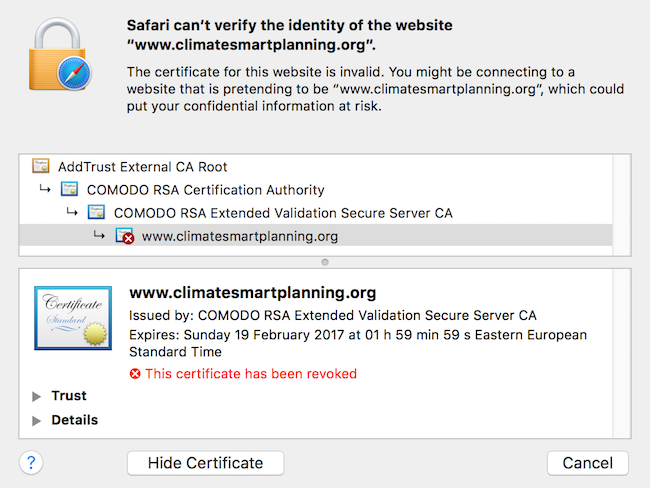The official website for the World Bank’s Climate-Smart Planning Platform has been hacked by at least two malicious actors, which has led to the site’s certificate being revoked.
The Climate-Smart Planning Platform (CSPP) is a World Bank-led project whose mission is to help practitioners in developing countries strengthen their climate-smart planning and implement better policies and investment programs. Internet security services company Netcraft noticed on Tuesday that the project’s website, climatesmartplanning.org, had been hosting a well-designed PayPal phishing page.
The CSPP website was ideal for phishing attacks as it used an Extended Validation (EV) SSL certificate issued by Comodo for the World Bank Group. EV SSL certificates, which provide the highest available level of trust and display the name of the owner in a green box in the browser’s address bar, can only be obtained after an extensive verification of the requesting entity’s identity.
The PayPal phishing page hosted on the compromised CSPP website was designed to trick users into handing over their email address, password, name, date of birth, postal address, phone number, credit card information, and 3-D Secure password. Once the information was collected, the victim was directed to the legitimate PayPal website.
While the URL of the phishing page showed that it was hosted on climatesmartplanning.org, the fact that the green address bar in the browser displayed “World Bank Group” might have convinced users that the page was legitimate.
The same CSPP website was also targeted by a different type of hacker. After the phishing page was removed by the CSPP webmasters, the site’s homepage was defaced by an Iraqi hacker who appears to deface random websites in an effort to boost his reputation among his peers.
Following the hacker attacks, the site’s EV certificate has been revoked. Web browsers, including Safari, Chrome and Firefox, currently prevent access to the website.

SecurityWeek contacted the World Bank, but the international financial institution said it generally does not comment on IT security issues.
Related Reading: Google Tells Symantec to Improve Digital Certificate Security
Related Reading: Let’s Encrypt Issues First Live Digital Certificate















